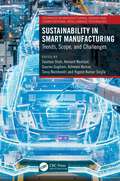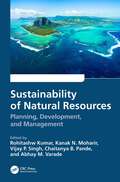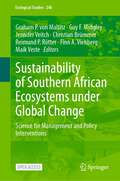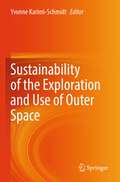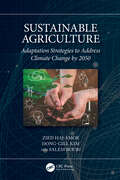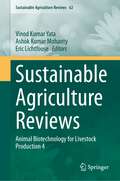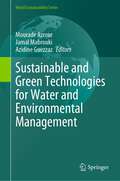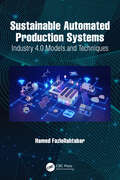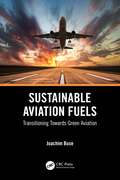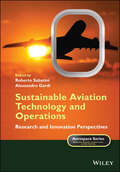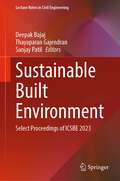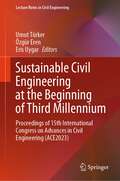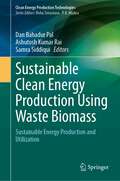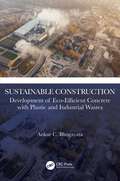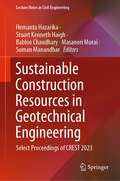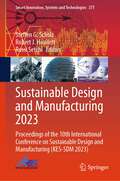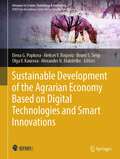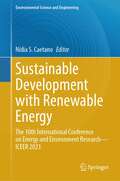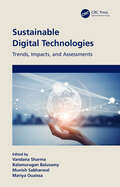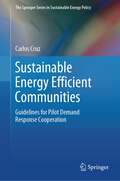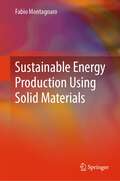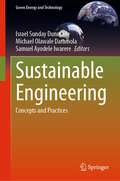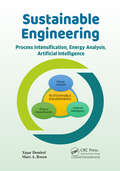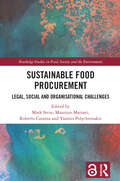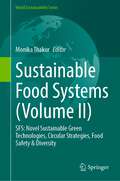- Table View
- List View
Sustainability in Smart Manufacturing: Trends, Scope, and Challenges (Advances in Manufacturing, Design and Computational Intelligence Techniques)
by Saumya Shah Hemant Nautiyal Gaurav Gugliani Ashwani Kumar Tanuj Namboodri Yogesh Kumar SinglaThis text highlights the role of artificial intelligence-powered robots and automation systems in revolutionizing digital manufacturing, covers prod-uct design and customization, and discusses various artificial intelligence algorithms for manufacturing processes and supply chain optimization. It further covers the applications of 3D printing and rapid prototyping for low-carbon development. Features:• Discusses microwave hybrid heating based on innovative joining tech-niques, applications of 3D printing, and rapid prototyping for low carbon development• Explains the role of artificial intelligence in digital manufacturing, data security, privacy issues, and defense mechanism• Provides an overview of artificial intelligence-powered robots and automation systems for revolutionizing digital manufacturing, and techniques for soft robotic structures• Presents case studies related to Six Sigma, digital manufacturing, and supply chain manufacturing• Explains artificial intelligence and machine learning-based high-predicted models for accurate data analysis in industry automationIt is primarily written for senior undergraduate, graduate students, and academic researchers in the fields of manufacturing engineering, industrial engineering, production engineering, mechanical engineering, and aerospace engineering.
Sustainability of Natural Resources: Planning, Development, and Management
by Vijay P. Singh Frank R. Spellman Rohitashw Kumar Chaitanya B. Pande Kanak N. Moharir Abhay M. VaradeAgriculture is the backbone of the economy in most countries and its output can be impacted by climate change effects. India, as well as other countries which are predominantly agricultural are facing various challenges due to increasing population which can be met by technological innovations for sustainable agriculture. Advanced and innovative technologies in agriculture will not only solve the problems of fulfilling the food requirement of the growing population but also sustain agriculture in the future. Sustainability of Natural Resources Planning and Management addresses the advancement of innovative techniques to address the issues of water scarcity and agricultural yield. It discusses various aspects of natural resource management, agriculture micro irrigation, AI applications for water management and impacts of climate change on water resources. This book also deals water resource exploration, planning, recent geographic information system-based studies, groundwater modelling, and related applications. It highlights the optimal strategies for sustainable water resource management and development. It also examines precision farming using remote sensing and GIS techniques.
Sustainability of Southern African Ecosystems under Global Change: Science for Management and Policy Interventions (Ecological Studies #248)
by Graham P. von Maltitz Guy F. Midgley Jennifer Veitch Christian Brümmer Reimund P. Rötter Finn A. Viehberg Maik VesteThis open access book about the sustainability of marine and terrestrial ecosystems in southern Africa provides a synthesis of the research program Science Partnerships for the Adaptation to Complex Earth System Processes (SPACES II, 2018-2022). It addresses the scientific, social, and economic issues related to climate change, its potential impacts on the various ecosystems, adaptations, and management interventions for enhancing systems resilience in Southern Africa. It is written by numerous scientists from African states and Germany and summarizes the latest research findings, which are of great relevance for a better understanding of climate change impacts, adaptations, and vulnerabilities as well as for developing management options and policy options to reduce the associated risks. This is crucial considering that the projected African population increase is exceptional. Furthermore, climate change is assumed to hit southern Africa extremely hard with a significant increase in extreme events and the frequency of severe droughts, heat waves, and flooding. Southern Africa hosts a high variety of ecosystems, which belongs to important biodiversity hotspots for unique flora and fauna. The surrounding oceans form, in turn, a bottle neck within the ocean’s global thermohaline circulation, act as a still poorly understood carbon sink and source and play an important role for fisheries as they are highly productive. Considering these important aspects, the book is an important interdisciplinary contribution to the scientific literature and will find a wide readership.The book is aimed at students, teachers, and scientists in the fields of terrestrial and marine ecology, environmental, nature and landscape planning, agriculture, environmental and resource management, biodiversity, and nature conservation, as well as scientists and representatives in specialised authorities and associations, nature conservationists, and policy makers of related disciplines.
Sustainability of the Exploration and Use of Outer Space
by Yvonne Karimi-SchmidtThis book provides insight into the significance of the law of outer space in promoting order, cooperation, and peaceful activities in space. It emphasizes the advantages of having a legal framework in place to govern space exploration and utilization, rather than relying on power and force.
Sustainable Agriculture: Adaptation Strategies to Address Climate Change by 2050
by Zied Haj-Amor Dong-Gill Kim Salem BouriEver-increasing population growth, combined with ongoing climate change signals that agriculture will face great challenges in ensuring global food security by 2050. Additionally, climate change-driven variations in mean sea level, wave conditions, storm surge, droughts, and river flows could have serious effects on agriculture and other sectors. Considering these factors and the extremely high value and necessity of agriculture worldwide, effective adaptation measures underpinned by reliable climate change impact assessments are essential to conserve soil and water resources and ensure food security. Sustainable Agriculture: Adaptation Strategies to Address Climate Change by 2050 provides a thorough examination of these issues, and presents in-depth analysis, practical case studies, and numerous examples of adaptation options throughout for various regions of the world.Features: Presents up-to-date, scientifically robust information on climate change projections in Europe, Asia, America, Africa, and Australia Provides pathways to sustainable agricultural options rather than just defining the climate change issue Includes case studies and practical examples throughout the world Presents a framework by which policymakers can begin implementing strategies for improving agricultural productivity
Sustainable Agriculture Reviews: Animal Biotechnology for Livestock Production 4 (Sustainable Agriculture Reviews #62)
by Vinod Kumar Yata Ashok Kumar Mohanty Eric LichtfouseThis book presents advanced reviews on latest developments and future trends of animal biotechnology with focus on computational and experimental approaches. The articles in this book discusses the implications of recent methods in animal biotechnology to improve the livestock production. Applications of omics technologies and system biology approaches for livestock production and animal disorders were discussed in detail. The evolution of transgenic technology, genome editing and markers for early pregnancy detection were elucidated in this book. A couple of chapters were dedicated to understanding the role of gut microbiome, probiotics and prebiotics on livestock health and production. The nanomaterials have been shown been shown beneficial effects in biological applications. This book also discussed the veterinary applications of nanomaterials. The articles of this book provide state of the art information that is appropriate to academicians, researchers and students who are involved in the animal biotechnology research.
Sustainable and Green Technologies for Water and Environmental Management (World Sustainability Series)
by Mourade Azrour Jamal Mabrouki Azidine GuezzazThis book introduces a variety of the latest researches that are related to smart devices, machine learning algorithms, and the Internet of things that are applied for a sustainable environment. These recent technologies cover all fields including agriculture, transportation, smart grid, smart building, and others. In addition, IoT has provided an innovative vision that is completely alternative to the conventional methodologies: the new approach comes in the form of a single-component system that can be connected to the network and can incorporate smart policies. As a consequence, the covered subjects encompass smart system design and control, networking and machine learning, environmental monitoring and surveillance, smart meters, authentication and authorization, ensuring private data security, software solutions, and systems, among others. This book covers subjects that are related to the Internet of Things and smart used tools and methods for fighting environmental problems. Therefore, it discusses recent ideas that are not covered by other competitor books. This book is different because it can be a reference for researchers, professionals, and students in both smart thinking and environmental domains.
Sustainable Automated Production Systems: Industry 4.0 Models and Techniques
by Hamed FazlollahtabarDue to disruptions occurring within production processes as a result of different circumstances, it is necessary to provide a new and safe production system that can be resilient to cope with any crisis, such as a pandemic. New sustainable automated production systems need to be proposed and adopted by industrial managers and this book fulfills that need.Sustainable Automated Production Systems: Industry 4.0 Models and Techniques includes the modern technologies of Industry 4.0 and discusses automated systems, robotic production, sustainable automation, production process automation, and the use of IoT in production. It goes over the circular economy and automated production processes and presents theories and practices associated with mathematical models of process automation in sustainable production. The book also investigates how sustainability in automated production systems using the IoT can present unique circumstances when pandemics or other disruptions are involved.The book includes chapters presenting sustainable production models and automated production using Industry 4.0 technologies and is targeted to help both practitioners and academics.
Sustainable Aviation Fuels: Transitioning Towards Green Aviation
by Joachim BuseSustainable Aviation Fuels discusses the transfer process of aviation to carbon-neutral flights, including how to manage the transition period. It also demonstrates how to develop and design a new approach for environmentally friendly air transport with reduced emissions. Covering the full scope of commercialisation, market considerations, advisements on investments and transition challenges of sustainable aviation fuels (SAF), the book tackles questions related to the cost of changing fuel types, competitive market models that can exist parallel to the oil industry and strategies for airlines to implement. It considers reliability requirements for feedstock suppliers and SAF producers, as well as ways to avoid feedstock shortages. The book will interest aviation industry professionals, fuel producers, airline fuel buyers, airport operators and propulsion engineers working on SAF production. Aviation, aerospace and business students taking courses in propulsion, gas turbine emissions, air transport management, supply chain development and sustainable energy production will find the book useful as well.
Sustainable Aviation Technology and Operations: Research and Innovation Perspectives (Aerospace Series)
by Roberto Sabatini Alessandro GardiSustainable Aviation Technology and Operations Comprehensively covers research and development initiatives to enhance the environmental sustainability of the??aviation sector Sustainable Aviation Technology and Operations provides a comprehensive and timely outlook of recent research advances in aeronautics and air transport, with emphasis on both long-term sustainable development goals and current achievements. This book discusses some of the most promising advances in aircraft technologies, air traffic management and systems engineering methodologies for sustainable aviation. The topics covered include: propulsion, aerodynamics, avionics, structures, materials, airspace management, biofuels and sustainable lifecycle management. The physical processes associated with various aircraft emissions — including air pollutants, noise and contrails — are presented to support the development of computational models for aircraft design, flight path optimization and environmental impact assessment. Relevant advances in systems engineering and lifecycle management processes are also covered, bridging some of the existing gaps between academic research and industry best practices. A collection of research case studies complements the book, highlighting opportunities for a timely uptake of the most promising technologies, towards a more efficient and environmentally sustainable aviation future. Key features: Contains important research and industry relevant contributions from world-class experts. Addresses recent advances in aviation sustainability including multidisciplinary design approaches and multi-objective operational optimisation methods. Includes a number of research case studies, addressing propulsion, aerostructures, alternative aviation fuels, avionics, air traffic management, and sustainable lifecycle management solutions. Sustainable Aviation Technology and Operations is an excellent book for aerospace engineers, aviation scientists, researchers and graduate students involved in the field.
Sustainable Built Environment: Select Proceedings of ICSBE 2023 (Lecture Notes in Civil Engineering #451)
by Deepak Bajaj Thayaparan Gajendran Sanjay PatilThis book presents the select proceedings of International Conference on Sustainable Built Environment (ICSBE 2023). It discusses the issues of sustainability and resilience in all types of building projects, construction projects, operational building, and infrastructure projects within urban regions of the world. The key themes covered in this book are sustainable urban planning, sustainable construction, real estate, housing, net-zero built environment, climate change policy, legal framework, climate finance, technology, and innovation toward decarbonization of the built environment. This book is useful for researchers and professionals working in the fields of construction management, built environment, and allied fields.
Sustainable Civil Engineering at the Beginning of Third Millennium: Proceedings of 15th International Congress on Advances in Civil Engineering (ACE2023) (Lecture Notes in Civil Engineering #481)
by Umut Türker Özgür Eren Eris UygarThis volume comprises selected peer-reviewed proceedings of 15th International Congress on Advances in Civil Engineering (ACE 2023) was held in Famagusta, North Cyprus in September 2023. This proceedings covers all disciplines of Civil Engineering classified under six main topics: Construction Management, Hydraulics, Geotechnics, Materials, Structures, Transportation, and Civil Engineering Education. It covers highly diverse research topics including investigation in the areas of innovative materials in concrete production, recycling of waste in the construction industry, fibre reinforced and high strength concrete, soil stabilization, problematic soils of semi-arid and arid regions, deep foundations, staged construction modelling, repair and maintenance of reinforced concrete, earthquake engineering and seismic retrofitting, coastal and harbour engineering, water resources management, hydrology & hydraulics engineering, traffic engineering and urban transport, life cycle cost analysis, decision making strategies.
Sustainable Clean Energy Production Using Waste Biomass: Sustainable Energy Production and Utilization (Clean Energy Production Technologies)
by Dan Bahadur Pal Ashutosh Kumar Rai Samra SiddiquiThis edited volume covers sustainable biomass valorization and its application in various sectors.Bioenergy has concerned enormous attention as a promising alternative to conventional energy resources. Abundance of bioresources and their renewable nature provides a distinct advantage to biofuels from sustainability perspective. Biofuels have found increasing applications in the energy and transportation sector in recent years. Blended fuels are being used worldwide. However, several challenges remain to be addressed due to the diverse nature of biomasses and inherent recalcitrant nature of biological materials used as feedstock. This book aims to provide an overview of recent developments in the production of bioenergy and its applications in various areas. Specific emphasis is given to production of biofuels from modern biomass such as agro-forest waste and dedicated non-edible energy crops that do not interfere with food production. The scope of the book covers synthesis and characterization of biologically derived fuels, advances in microbiological methods and enzyme engineering approaches. The book covers techno-economic analysis to identify challenges and prospects for commercialization of biofuels. The directions for future research should pave way for net zero scenario for a sustainable world.The book will cater to a wide range of readers interested in learning the fundamentals as well as advances in the field of biofuels.
Sustainable Construction: Development of Eco-Efficient Concrete with Plastic and Industrial Wastes
by Ankur C. BhogayataThis book focuses on the utilization of wastes produced from plastic usage by industry and consumers, along with the partial to full replacement of conventional cement as a primary binder material in concrete. This book demonstrates how to use post-consumer waste plastics and industry wastes from thermal power stations, agro-industries, and metal industries with a scientific approach to conventional concrete. The primary aim is to demonstrate the methods to prepare a sustainable alternative construction material of concrete using waste materials. Features: Illustrates making eco-friendly procedures of concrete construction popular by way of utilization of plastics and industrial wastes Covers all major aspects of plastic waste-based concrete from conception to execution Promotes alternative materials for sustainable construction Describes economic aspects of using eco-efficient concrete on a mass scale Includes experimental results with graphs This book is aimed at researchers and graduate students in civil engineering, construction materials, and concrete.
Sustainable Construction Resources in Geotechnical Engineering: Select Proceedings of CREST 2023 (Lecture Notes in Civil Engineering #448)
by Hemanta Hazarika Stuart Kenneth Haigh Babloo Chaudhary Masanori Murai Suman ManandharThis book presents select proceedings of the 2nd International Conference on Construction Resources for Environmentally Sustainable Technologies (CREST 2023), and focuses on sustainability, promotion of new ideas and innovations in design, construction and maintenance of geotechnical structures with the aim of contributing towards climate change adaptation and disaster resiliency to meet the UN Sustainable Development Goals (SDGs). It presents latest research, information, technological advancement, practical challenges encountered, and solutions adopted in the field of geotechnical engineering for sustainable infrastructure towards climate change adaptation. This volume will be of interest to those in academia and industry alike.
Sustainable Design and Manufacturing 2023: Proceedings of the 10th International Conference on Sustainable Design and Manufacturing (KES-SDM 2023) (Smart Innovation, Systems and Technologies #377)
by Steffen G. Scholz Robert J. Howlett Rossi SetchiThe book consists of peer-reviewed papers presented at the International Conference on Sustainable Design and Manufacturing (SDM 2023). Leading-edge research into sustainable design and manufacturing aims to enable the manufacturing industry to grow by adopting more advanced technologies and at the same time improve its sustainability by reducing its environmental impact. Relevant themes and topics include sustainable design, innovation and services; sustainable manufacturing processes and technology; sustainable manufacturing systems and enterprises; decision support for sustainability; and Industry 4.0 and Intelligent Manufacturing. Application areas are wide and varied. The book provides an excellent overview of the latest developments in the sustainable design and manufacturing area.
Sustainable Development of the Agrarian Economy Based on Digital Technologies and Smart Innovations (Advances in Science, Technology & Innovation)
by Elena G. Popkova Aleksei V. Bogoviz Bruno S. Sergi Olga V. Kaurova Alexander N. MaloletkoThis book elaborates on the modern experience and prospects and the development of recommendations for sustainable development of the agrarian economy based on digital technologies and smart innovations for the provision of food security. This book dwells on the global and regional challenges for food security and answers to them through the sustainable development of the agrarian economy. The book also studies the international experience of sustainable development of the agrarian economy on the basis of digital technologies and advantages for food security. Sustainable development of the agrarian economy with the use of digital technologies—as the foundation of food security of Central Asia—is considered. The prospects for provision of food security through the use of smart innovations for the sustainable development of the agrarian economy are outlined. A set of applied recommendations for raising the effectiveness of the use of smart innovations for the sustainable development of the agrarian economy is proposed.
Sustainable Development with Renewable Energy: The 10th International Conference on Energy and Environment Research—ICEER 2023 (Environmental Science and Engineering)
by Nídia S. CaetanoThis proceedings book contains the full papers of the 10th edition of the International Conference on Energy and Environment Research, ICEER 2023, that took place in Madrid, Spain during October 7–9, 2023. ICEER 2023 is a joint organization of the School of Engineering (ISEP) of the Polytechnic of Porto (P.Porto) and the SCIEI, with collaboration of the Dipartimento di Ingegneria of the Università degli studi "Roma Tre", CIETI and LEPABE research groups. This book includes all the well prepared full papers presented at ICEER 2023.
Sustainable Digital Technologies: Trends, Impacts, and Assessments
by Vandana Sharma, Balamurugan Balusamy, Munish Sabharwal, and Mariya OuaissaThis book is a reference on digital technology and its impact on sustainability, providing insight into sustainable practices globally. It focuses on the critical practices leading to sustainable initiatives among various organizations, IT infrastructure, communities, and government compliance. The book describes the green computing paradigms and the impact of a circular economy with a focus on sustainable practices in a post-pandemic world. Sustainable Digital Technologies: Trends, Impacts, and Assessments discusses the critical factors leading to sustainable initiatives in a global economy. It highlights the impact of digital technology and Industry 4.0 in today’s world. The book focuses on the role, responsibility, and the effect of the Internet of Things for digital sustainability and practices. It describes implementation strategies for green cloud computing and presents additional strategies for sustainable practices in a post-pandemic world. This publication is designed for use by technology development academicians, data scientists, industrial professionals, researchers, and students interested in uncovering the latest innovations in the field and the current research on problem-oriented processing techniques in sustainable and evolutionary computing applications with reduced energy channelization.
Sustainable Energy Efficient Communities: Guidelines for Pilot Demand Response Cooperation (The Springer Series in Sustainable Energy Policy)
by Carlos CruzThis book analyses issues surrounding the efficient integration of demand response programmes in residential communities. It also explores the benefits and energy efficiency co-ordination corresponding to demand response service in a cooperative system. The author explains how sensors, communication technologies, computational ability, and control can be effectively combined to create a demand planification system. Smart appliances (SAs) and other connected devices, together with smart communities (SCs)—which enable energy consumers to pursue common goals through cooperation and coordinated behaviour within the framework of the Internet of things (IoT)—have raised expectations regarding deployment of the information and communication technologies (ICTs) to encourage uptake of demand response (DR) energy efficiency programmes. DR programmes pursue a reduced carbon footprint, balanced supply and demand, and behavioural change in consumers. The book provides sustainable evidence of ICT-supported energy management that can help consumers flexibly manage demand through the formation of sustainable SCs that maximise renewable energy use through large-scale cooperative management mechanisms. SCs cooperating securely in identifying consumption patterns can foster sustainable and efficient energy use, with the outcome of benefits for the participants and for the environment.
Sustainable Energy Production Using Solid Materials
by Fabio MontagnaroThis textbook focuses on sustainable energy production using solid materials. With explanatory tables and figures, case studies, worked-out examples, and up-to-date bibliographies of other works, the book provides an in-depth exploration of the most innovative aspects of the field.Readers of the book will gain critical skills in characterizing and reacting to biomass, including the formation of pollutants, as well as using fluidized bed reactors for heterogeneous processes. The book also explores innovative methods for mitigating the greenhouse effect, reusing ashes as adsorbents or in cement production, and thermochemical solar energy storage. This book will give students, novice researchers, and industry professionals valuable insights and knowledge into the sustainable production of energy using solid materials.
Sustainable Engineering: Concepts and Practices (Green Energy and Technology)
by Israel Sunday Dunmade Michael Olawale Daramola Samuel Ayodele IwarereSustainable Engineering: Concepts and Practices provides insights into current perspectives on sustainable engineering research. It highlights the drivers, motivations, and challenges affecting the development and adoption of sustainable engineering in various sectors of the economy and how they impact sustainable development. Contributions from researchers representing multiple branches of engineering in academia, government laboratories, and industry present alternative approaches to traditional engineering practices. These approaches effect change, making the design, construction, production, and management of products, processes, and systems more environmentally friendly, socially beneficial, and economically profitable. The book will be a trusted reference for graduate students, practicing engineers, and other professionals interested in developing or using sustainable products and systems.
Sustainable Engineering: Process Intensification, Energy Analysis, and Artificial Intelligence
by Yasar Demirel Marc A. RosenSustainable engineering is of great importance for resilient and agile technology and society. This book balances economics, environment, and societal elements of sustainable engineering by integrating process intensification, energy analysis, and artificial intelligence to reduce production costs, improve the use of material and energy, product quality, safety, societal well-being, and water usage. The book provides comprehensive discussion of topics on process intensification, energy analysis, and artificial intelligence that include optimization, energy integration, green engineering, pinch analysis, exergy analysis, feasibility analysis, life cycle assessment, circular economy, bioeconomy, data processing, machine learning, expert systems, digital twins, and self-optimized plants for sustainable engineering.
Sustainable Food Procurement: Legal, Social and Organisational Challenges (Routledge Studies in Food, Society and the Environment)
by Mark Stein Maurizio Mariani Roberto Caranta Yiannis PolychronakisThe book examines sustainable food procurement policy and practice in the European Union and beyond, exploring the extent to which sustainability objectives have been achieved and evaluating the new developments taking place at both EU and national levels.While there is a growing recognition that public authorities can use public procurement as a policy tool to pursue multiple environmental, health and socio-economic objectives, contracting authorities still face many challenges. This volume investigates the scope for pursuing sustainable objectives in public procurement of food and catering services, examining different regulatory contexts and organisational models to answer the overall question of how to integrate sustainability concerns into the various phases of public food procurement processes. Contributions in the book examine the policy and legal procurement framework and practices for sustainable public catering in three EU Member States: Italy, France and Spain. There is a comparative survey of the Baltic Region, including Denmark, Estonia, Finland, Poland and Russia, and moving beyond the EU, there is examination of the UK and Brazil, as well as a cross country comparison of the UK with Denmark and Sweden. Drawing on the expertise of an interdisciplinary and intersectoral team of contributors allows the book to benefit from the insights of different disciplines, including business sciences, anthropology and law. Tapping into the global discussion on public food procurement as a means to achieve multiple social and environmental goals, this work will stimulate readers looking for new creative ways to create value through public food purchasing.This book will be of great interest to students, researchers, policymakers and public- and private-sector representatives interested in public procurement, food policy and law, sustainable food sourcing and supply chain management.
Sustainable Food Systems: SFS: Novel Sustainable Green Technologies, Circular Strategies, Food Safety & Diversity (World Sustainability Series)
by Monika ThakurSustainable Food System has cutting-edge green & circular Technologies, food Safety & diversity that aims to provide quality and safe foods in an environmentally conscious and sustainable way. The book addresses both the theoretical and applied aspects of sustainable food diverse food systems. This concept of Sustainable Food System under SDG Goals is such a vast concept that, it has been impossible to highlight all the concepts in one volume. Therefore, the Editor have compiled this voluminous, comprehensive and compendious approach as balanced and organized structure of work as: Sustainable Food System Volume I & II.A Sustainable Food System (SFS) is a comprehensive food system and Volume II targets the Novel Sustainable Green Food Processing Technologies, Circular Strategies for Recovery & Valorization and the overall sustainable techniques for Food Safety & Food Diversity. The book has a very comprehensive outline, divided in 3 major sections and further 20 different chapters. All chapters in different sections will be written by key scientists with diverse backgrounds in either industry / R&D / academia, and will provide an update on emerging ideas and sustainable technologies as well as vision for the future. The Section 5: Novel Sustainable Green Food Processing Technologies primarily focusing on the novel green different food processing technologies in different food categories. The Section 6: Circular Strategies for Recovery & Valorization, deals with different circular strategies for valorization of the food products. The Section 7: Sustainable Techniques for Food Safety & Food Diversity, will cover the food safety trends and food diversities nationally & internationally.
